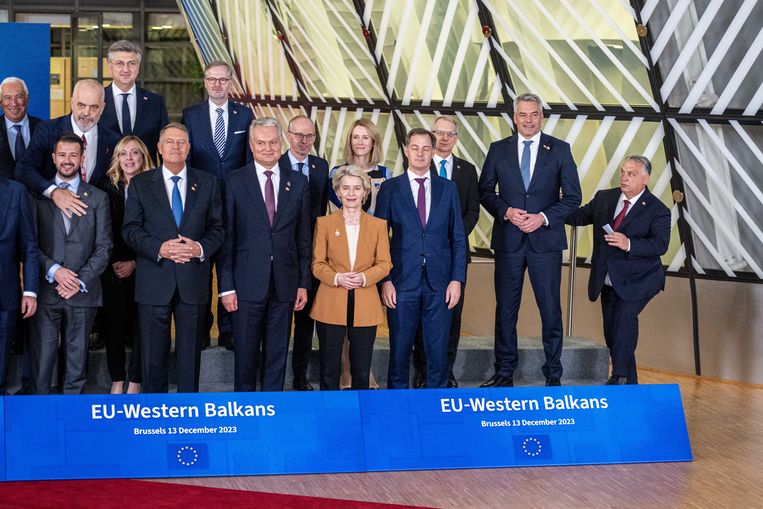The historic failure that many European government leaders feared – no additional money and no EU perspective in dealing with Ukraine – has not materialised. Hungarian Prime Minister Viktor Orban removed his first veto on Thursday evening with a unique action, and his second may evaporate next month. Orban is aware of the secret of the European conference table: it is there that leaders count their political buttons in private.
Yet the surprise at Orban’s flexibility has been great. In the run-up to the EU summit, he publicly announced a double “no” to Kiev. He did not agree to start negotiations for Ukraine’s accession to the European Union, nor to new financial support worth 50 billion euros for Kiev. In a letter to EU President Charles Michel, Orban asked to remove these topics from the agenda to prevent the “inevitable failure” of the EU summit.
On Thursday, upon his arrival in Brussels, he triumphantly waved his veto at the cameras, but that fighting spirit quickly faded in the conference room. Orban has been subjected to harsh talk by his colleagues, especially the Baltic and Czech prime ministers. They accused Orban of playing with fire by obstructing the start of accession negotiations with Kiev. His veto would play into Moscow’s hands and put him in a corner as Putin’s pup.
Without losing face
It was German Chancellor Olaf Scholz who earlier that day had indicated to Orban a way out without losing face: simply leave the conference room while we discussed conclusions about the future enlargement of the European Union. And so it happened: Orbán was “temporarily absent from the room in a constructive and prepared manner,” as they said in the corridors. The other commanders had been informed in advance of this disappearing act, so no one asked: “Shouldn’t we wait for Victor?”
No one knows exactly why Orbán agreed to this unique solution. But several leaders pointed out the political capital he would have lost if he had used his veto. Brussels is a large, multi-dimensional negotiating platform, and the final settlement is placed on the leaders’ conference table. A “no” on such an important point costs Orban a lot of credit, politically but also in real terms: it is member states that decide if and when Hungary will receive the €21 billion in subsidies and loans that have been frozen from the EU. The country does not meet the rules of the rule of law.
Retreating behind the scenes, knowing that he can derail negotiations with Kiev for at least another eighty minutes, is not an odd choice. Outgoing Prime Minister Mark Rutte indicated at the beginning of the EU summit that insisting on rejection would cause “huge political damage” to Orban. “So I still have to see what happens.”
stubborn
During the evening dinner discussion about 50 billion euros in new financial aid for Kiev, Orban showed himself more stubborn. He sees this aid as wasted money and does not at all want to finance it through the European Union budget. If his 26 colleagues want to help Kiev, they can do so themselves.
Hungary’s share of aid will reach about $230 million over the next four years. This is not insurmountable, but going through the pump twice in one night was too much for Orbán. On the other hand, Germany insisted on a solution through the EU budget, with 27 countries as a sign of unity.
Rutte also called for a solution through the European Union budget. He stressed that the construction, in which 26 countries are participating, requires obtaining separate permission from the House of Representatives, and this is not guaranteed.
At approximately 2:30 a.m., the leaders ended their discussion without reaching an agreement. Michel decided to hold an additional European Union summit at the end of January or beginning of February. He hopes that Orban will be part of the delegation by then. If not, the alternative plan is ready to pay billions to Ukraine along with the 26 countries. Michelle has complete confidence in a positive outcome, and respect and trust at the conference table is what it’s all about. He pointed out that Orban agreed without complaint to the twelfth sanctions package against Moscow during the European Union summit.

“Lifelong food practitioner. Zombie geek. Explorer. Reader. Subtly charming gamer. Entrepreneur. Devoted analyst.”











More Stories
Massive whale smashes boat off New Hampshire coast
Then the left bloc reaches an agreement on a candidate for prime minister.
EU criticizes Israeli PM for distorting history, court ruling